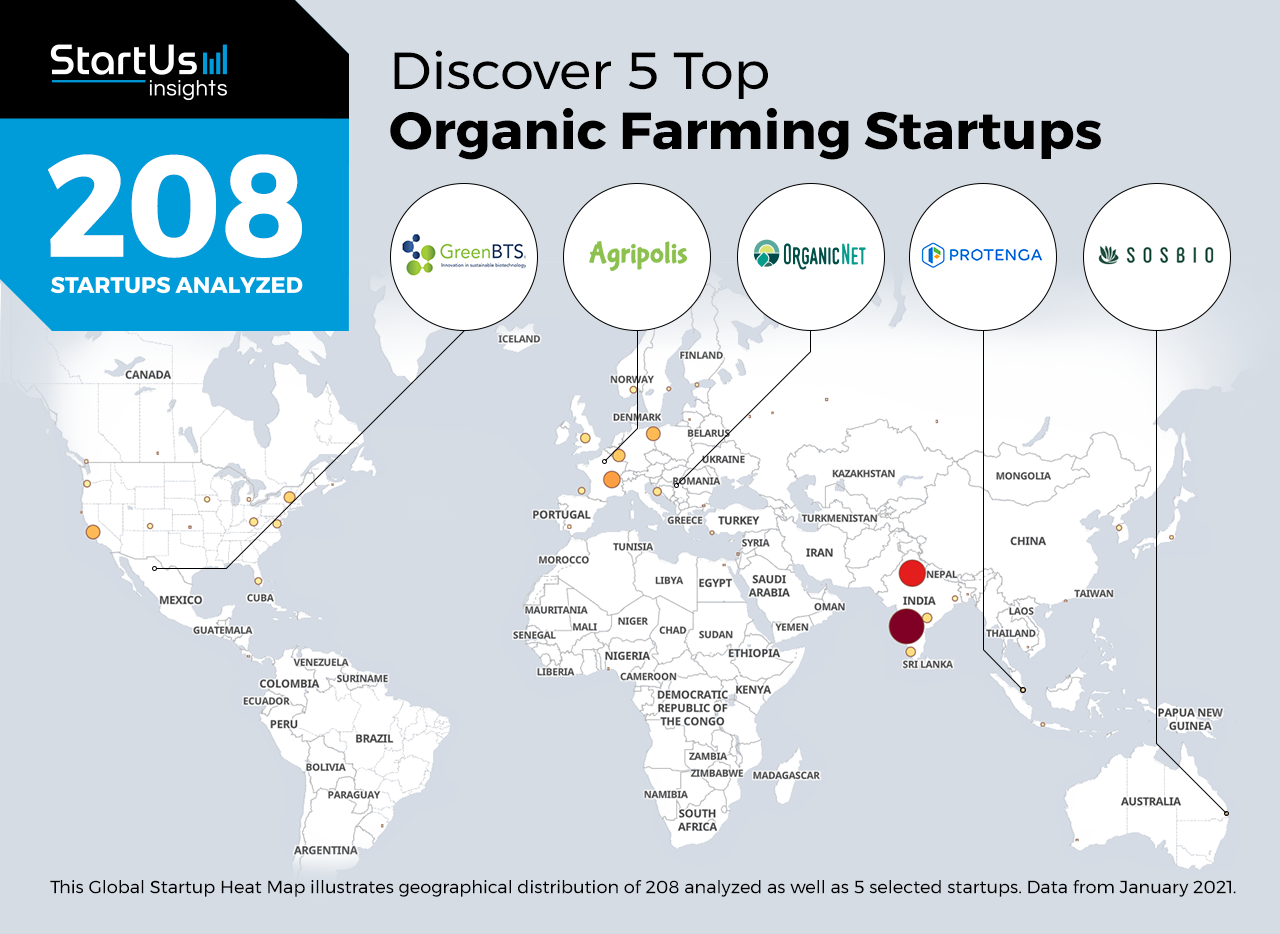Staying ahead of the technology curve means strengthening your competitive advantage. That is why we give you data-driven innovation insights into the agriculture industry. This time, you get to discover 5 hand-picked startups developing organic farming solutions.
Global Startup Heat Map: 5 Top Organic Farming Startups
The 5 organic farming startups you will explore below are chosen based on our data-driven startup scouting approach, taking into account factors such as location, founding year, and relevance of technology, among others. This analysis is based on the Big Data & Artificial Intelligence (AI)-powered StartUs Insights Discovery Platform, covering over 1.3 million startups & scaleups globally.
The Global Startup Heat Map below highlights the 5 organic farming startups & scaleups our Innovation Researchers curated for this report. Moreover, you get insights into regions that observe a high startup activity and the global geographic distribution of the 208 companies we analyzed for this specific topic.
Green BTS develops Organic Pesticides
Many farmers still apply eco-unfriendly conventional herbicides, fungicides, and insecticides. However sustainable agriculture solutions utilize organic agrochemicals that have a lower ecological impact. Emerging companies formulate organic pesticides, based on safe natural extracts, that improve crop resistance against weeds and are less harmful to the environment.
Mexican startup Green BTS merges biotechnology, computer science, and design to produce a line of solutions for organic farmers. G-BIO is a combined biofungicide and biofertilizer for any type of plants, cultures, and crops. It guarantees long-lasting protection from more than 40 kinds of plagues and diseases, reduces harvest time, and does not trigger resistance to pathogens.
Agripolis mitigates challenges in Urban Organic Farming
The demand for organic produce among large city dwellers is on the rise. Startups tackle this concern in two ways: either by supplying small self-watering indoor garden kits to customers or by growing sustainable fruits & vegetables in space-efficient urban farms and delivering them to clients. Urban farming startups leverage the potential of hydroponics and vertical farming to allow individuals to produce organic products within big cities.
French startup Agripolis mitigates the challenges of local organic production in modern big cities with its urban farming solutions. Agripolis utilizes rooftops and unused urban spaces to design, construct and run organic farming installations. The startup applies the productive culture column technique, aeroponics, and organic nutrients to grow organic produce without the use of pesticides.
OrganicNet operates Organic Food Marketplaces
When ordering organic food, people like to be assured that the produce meets all quality standards. Conversely, organic producers aspire to increase the number of distribution channels and establish a successful market presence. To bridge these demands, startups create organic food marketplaces that connect suppliers and buyers, as well as facilitate the movement of products from farm to table.
Serbian startup OrganicNet operates an online social marketplace that bridges environmentally conscious consumers with certified organic food producers. OrganicNet also facilitates direct communication between all stakeholders. The startup’s knowledge-sharing platform aids farmers in finding relevant information aggregated from relevant sources and establishing their strong market entry.
Protenga enables Conversion of Organic Waste to Protein
One of the problems that organic growers often face is the disposal of organic waste. Conventionally, farmers use some of it for either composting or vermicomposting. Startups and innovative companies diversify the direction of use with novel recycling or repurposing schemes, valorization, and upcycling processes. This creates new value-added products for agriculture and associated sectors.
Singaporean startup Protenga creates modular Smart Insect Farms based on the principles of the circular economy. Protenga’s highly productive strains of insects recapture nutrients from organic waste. The insects transform the waste into proteins for pet food, aquaculture, and organic farming. Besides, the solution includes the Internet of Things (IoT) monitoring and smart controls for better waste-to-protein conversion management.
SOSBio develops Organic Fertilizers
The adverse repercussions of traditional chemical fertilizers on food production drive today’s organic farmers towards applying natural fertilizers. Startups and scaleups develop organic fertilizers that sustainably increase crop yields and do not distress biological ecosystems. These solutions utilize plant- and animal-based sources, as well as algae extracts and biosolids.
Australian startup SOSBio strives to develop eco-friendly fertilization solutions that combine the efficiency of chemical fertilizers with the sustainability benefits of conventional organic ones. CropUp is an organic fertilizer and long-term soil conditioner with an adaptive nutrient release. This fertilizer promotes nitrogen saturation, stimulates microbial activity, and, consequently, fosters crop health and growth.
Discover more AgriTech startups
To keep you up-to-date on the latest technology and emerging solutions, we provide you with actionable innovation intelligence – quickly and exhaustively. You can download our free AgriTech Innovation Report and discover new business opportunities or save your time & let us look into your areas of interest. We provide you with an exhaustive overview of new startups, scaleups & emerging technologies that matter to you.









